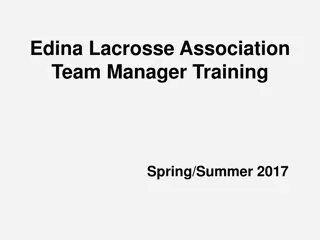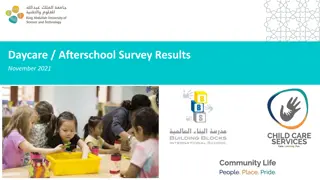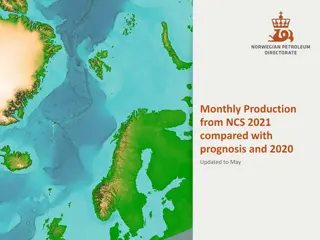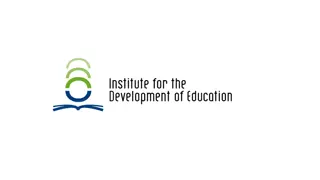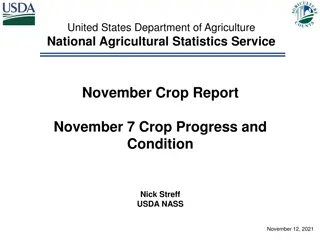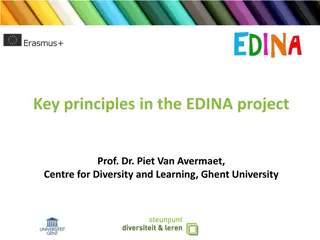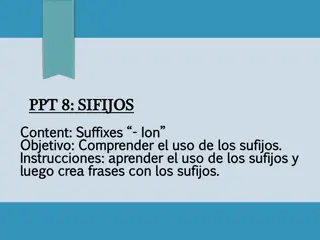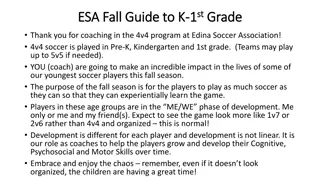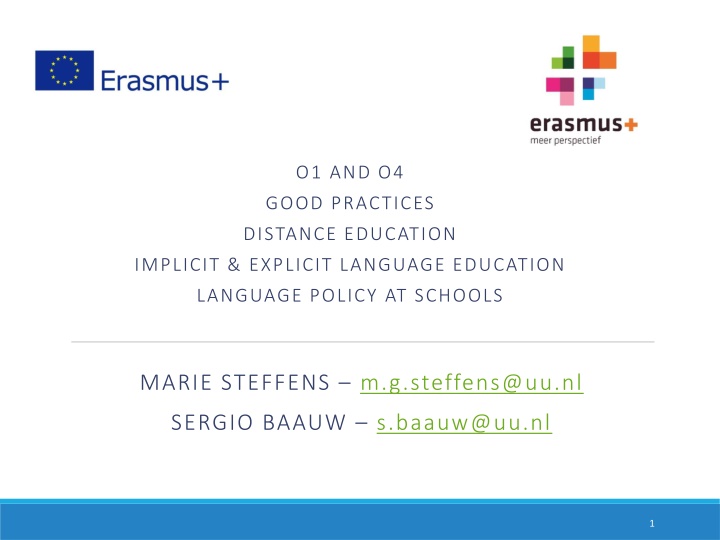
Good Practices and Challenges in Distance Education Language Policy at Schools
Explore the implications of implicit and explicit language education policies in distance education. Learn about the main issues faced by teachers transitioning to online teaching, tools available, and insights gained from the experience. Follow a study on the impact of the first lockdown on education in the Netherlands.
Download Presentation

Please find below an Image/Link to download the presentation.
The content on the website is provided AS IS for your information and personal use only. It may not be sold, licensed, or shared on other websites without obtaining consent from the author. If you encounter any issues during the download, it is possible that the publisher has removed the file from their server.
You are allowed to download the files provided on this website for personal or commercial use, subject to the condition that they are used lawfully. All files are the property of their respective owners.
The content on the website is provided AS IS for your information and personal use only. It may not be sold, licensed, or shared on other websites without obtaining consent from the author.
E N D
Presentation Transcript
O1 AND O4 GOOD PRACTICES DISTANCE EDUCATION IMPLICIT & EXPLICIT LANGUAGE EDUCATION LANGUAGE POLICY AT SCHOOLS MARIE STEFFENS m.g.steffens@uu.nl SERGIO BAAUW s.baauw@uu.nl 1
O1: Distance education What are the main issues teachers of NAM pupils encountered with the transition of offline to online teaching? o What information and/or tools about online and remote teaching were available to deal with this transition and was it easy to obtain and use? o Have teachers applied this available information and the obtained experience during the second transition? o What have they learned from their experience with online teaching? 3
O1: Distance education Follow up of earlier small-scale study (May 2020) 22 questions, using Qualtrics software The survey was then distributed via e-mail to 64 primary schools, 64 secondary schools and 3 European schools in The Netherlands 50 teachers responded 4
01: Distance education First lockdown School closures from March 16th until June 2nd (secondary education) and March 16th until June 8th (primary education) in the Netherlands. 6 16-11-2021 - EDINA SGM 5
01: Distance education First lockdown 7 16-11-2021 - EDINA SGM 5
01: Distance education First lockdown 8 16-11-2021 - EDINA SGM 5
01: Distance education First lockdown 9 16-11-2021 - EDINA SGM 5
01: Distance education First lockdown 10 27-11-2017 - EDINA SGM 5
01: Distance education Second lockdown 11 27-11-2017 - EDINA SGM 5
01: Distance education Second lockdown 12 27-11-2017 - EDINA SGM 5
01: Distance education Looking ahead Alignment with other ISKs/schools with newcomer children. How do they handle it? exchange with each other ; Offer for newcomers where less written Dutch language is used. So more practical. This makes it easier for parents at home to guide and understand ; peer consultation would be good or a site where best practices are collected ; Online teaching course for teachers ; The online teaching material is starting to run out, at a certain point you have completed all the reading texts and assignments that are online with the students or had them made by the students. More online teaching material is therefore necessary ; How to increase the level of my online lessons, self-skills. What works, which materials work ; 13 27-11-2017 - EDINA SGM 5
01: Attitudes on multilingual Education of Professionals How do education professionals, working in primary schools in the Randstad area, perceive the recommendations from the literature on the implementation of multilingualism and intercultural education in the Dutch mainstream primary education system? (i) Research on recommendations from the literature regarding the use of home languages (ii) Research on language and intercultural policies in school plans (iii) Survey among teachers about use of home languages and cultures 14 27-11-2017 - EDINA SGM 5
Literature vs. school plan The recommendations from the literature on multilingualism that were most frequently found in the School Plans focus on: Actively involving parents in the educational process of the multilingual pupils and Providing functional, motivational and meaningful tasks to teaching Dutch as a second language In areas outside of the main big cities in the western part of the Netherlands, such as Friesland, schools are more actively working on implementing multilingualism in the curriculum (Duarte, 2020). Other recommendations such as positive attitude towards the home languages, use of translanguaging, developing the child s complete linguistic repetoire were hardly mentioned. 15 27-11-2017 - EDINA SGM 5
Survey: multilingualism 40% of the respondents indicate that they have reasonable experience in implementing multilingualism in their work. 28,13% say they have a lot to a lot of experience and 31,25% say they have little to no experience Teachers in general agree with most findings from the literature regarding multilingualism The question about practical applicability shows a greater spread in results than the question about agreeing with the recommendation 16 27-11-2017 - EDINA SGM 5
Survey: intercultural education The respondents agreed with the recommendations on intercultural education, 84% strongly agreed and 18% partially agreed. This drops however when it comes to the practical applicability of the recommendations, 62% strongly agreed and 24% partially agreed. Most respondents agree with the use of activities that pay attention to the cultural background of the student. Respondents least agreed with ending the prohibition and/or penalization of pupils speaking their home languages in class . 17 27-11-2017 - EDINA SGM 5
Attitudes of Education Professionals 18 27-11-2017 - EDINA SGM 5
Attitudes of Education Professionals 19 27-11-2017 - EDINA SGM 5
Attitudes of Education Professionals 20 27-11-2017 - EDINA SGM 5
Attitudes of Education Professionals 21 27-11-2017 - EDINA SGM 5
04: implicit vs. explicit knowledge and teaching The language teaching process must be enhanced by better understanding: How a second language (L2) is most effectively acquired How migrant pupils prior knowledge can be more concretely integrated into practices The role of metalinguistic awareness in this Implicit knowledge is unconscious and intuitive, it provides speakers with a feel for grammatical correctness and bolsters language competence, including comprehension, and speech production (Ellis, 2008; Krashen, 1982; Kim & Nam, 2017). Goal of the study: Gain insight into teaching practices and methods regarding implicit knowledge by conducting research with teachers of German as a non-native language. 22 27-11-2017 - EDINA SGM 5
04: implicit vs. explicit knowledge and teaching RQ: How can the implicit knowledge of newly arrived migrant children be concretely assessed and used in teaching practices to enhance their education process in Germany? SQ1: How can pupils first languages or other languages be beneficially integrated into teaching practices to make use of their implicit knowledge? SQ2: In what way can the use of pupils prior knowledge in second language teaching promote the inclusion of newly arrived migrant children? 23 27-11-2017 - EDINA SGM 5
04: implicit vs. explicit knowledge and teaching Method: survey and interviews Participants: 47 responses 24 27-11-2017 - EDINA SGM 5
04: implicit vs. explicit knowledge and teaching 25 27-11-2017 - EDINA SGM 5
04: implicit vs. explicit knowledge and teaching 26 27-11-2017 - EDINA SGM 5
04: implicit vs. explicit knowledge and teaching 27 27-11-2017 - EDINA SGM 5
04: implicit vs. explicit knowledge and teaching 28 27-11-2017 - EDINA SGM 5
04: implicit vs. explicit knowledge and teaching 29 27-11-2017 - EDINA SGM 5
04: implicit vs. explicit knowledge and teaching 30 27-11-2017 - EDINA SGM 5
04: implicit vs. explicit knowledge and teaching Conclusions on use of implicit language methods Although the majority of DaZ and DaF teachers assesses and uses the implicit language knowledge of their pupils during and through their teaching, the practices, and methods they apply to do so can differ, depending on the training they have obtained, their teaching experience as well as their familiarity with the topic. Used methods: - visual materials, working with well-known music, rhymes or stories as well as initiating narrative conversations. - Total Physical Response 31 27-11-2017 - EDINA SGM 5
04: implicit vs. explicit knowledge and teaching Conclusions on use home languages Almost half of the participants apply other languages than German in the classroom to assess the implicit knowledge of pupils, while approximately a quarter disagreed. Especially teachers who received training independently from a degree, who solely obtained knowledge about DaZ or DaF through practice as well as the individuals who got another kind of training indicated that they employ other languages, while the answers of the participants with a teaching degree varied considerably. It shall be signaled to pupils that they are allowed to speak in their own L1 as this will highlight that their language is appreciated and their input is valued, even if it is in another language. 32 27-11-2017 - EDINA SGM 5
Dissemination Hogeschool Utrecht/LOWAN lunch lectures, in collaboration with Stad Gent, on newcomer assessment (24 June, 2021) RUG Summer School workshop, on assessment of newcomers speaking a non- standardized language variety, in collaboration with LOWAN (1 July, 2021) Promotional video ERASMUS+, on EDINA Member of LOWAN-supported community Een sterke start Winter School, being prepared with Eekhout Academy on 8 and 10 February 2022: Workshop on use padlets for exchange good practices School visit to Hugo de Groot school (reception classes, BOOR), Rotterdam 33
Merci pour votre attention! Dank voor jullie aandacht! Thanks for your attention! Gracias por vuestra atenci n! Questions? Vragen? Preguntas? Remarks, suggestions? 34





